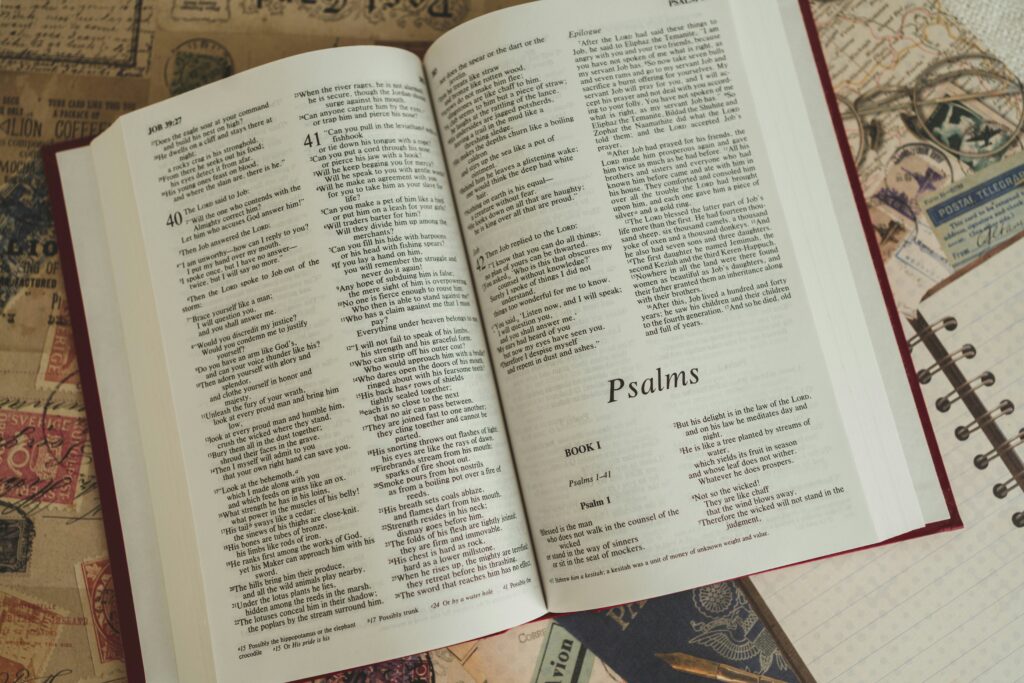
Structure, Authors, and How They Fit Together
The Bible is not a single book but a collection of writings composed over many centuries.
Understanding the books of the Bible helps readers see how Scripture is organized, who wrote the different books, and how they connect together.
This guide provides an overview of the 66 books of the Bible, explains their structure, and introduces the traditional authors associated with each section. Whether you are new to Bible study or seeking a clearer overview, this article will help you understand how the books fit into one unified narrative.
For a broader introduction to Scripture as a whole, you may also find our article on The Holy Bible helpful.
When I first started reading the Bible, I was overwhelmed. Sixty-six books? Different genres? Prophets, poetry, parables… Where do you even begin? If that sounds familiar, you’re not alone. I remember how I struggled. I hope this explanation here makes things simple for you.
Whether you’re brand new to the Bible or have been a believer for years, understanding the books of the Bible is foundational to your spiritual growth. It helps you keep things in their right perspective.
How the Bible Is Organized
The Bible isn’t just one big book. It’s a library of 66 books, written by over 40 different authors, over a span of 1,500 years—yet it all tells one unified story: God’s plan to redeem mankind through Jesus Christ. The Bible is divided into two main sections:
- Old Testament (39 books)
- New Testament (27 books)
Each section contains different types of writing, including history, poetry, prophecy, biography, and letters.
Old Testament – 39 Books
These were written before Jesus was born. They cover the creation of the world we live in and the creation of mankind, the first sin and the fall of man,
God’s law for fallen man, Israel’s history, prophecies about the future, poetry, and promises of the coming Messiah.
They include books like:
- Genesis (The beginning of creation)
- Exodus (God rescues His people)
- Psalms (Songs and prayers)
- Isaiah (Prophecies of Jesus)
The Old Testament is further divided into 5 categories.
1. The Pentateuch (Law)
These first five books are traditionally attributed to Moses:
- Genesis
- Exodus
- Leviticus
- Numbers
- Deuteronomy
They describe creation, early humanity, the covenant with Abraham, Israel’s deliverance from Egypt, and the giving of the Law.
2. Historical Books
These books record Israel’s history in the Promised Land.
Traditional authors include:
- Joshua — possibly written or compiled under Joshua’s leadership
- Judges & Ruth — traditionally associated with Samuel
- 1 & 2 Samuel — attributed in part to Samuel, with later prophetic contributors
- 1 & 2 Kings — often associated with prophetic historians
- 1 & 2 Chronicles — traditionally linked to Ezra
- Ezra & Nehemiah — often attributed to Ezra
- Esther — author unknown
These books describe Israel’s leadership, kingship, exile, and return.
3. Wisdom and Poetry Books
These books focus on worship, wisdom, and reflection.
- Job — author uncertain
- Psalms — many written by King David; others by various authors
- Proverbs — primarily attributed to Solomon
- Ecclesiastes — traditionally attributed to Solomon
- Song of Solomon — attributed to Solomon
These writings address human suffering, praise, wisdom, and relationships.
4. Major Prophets
These books contain prophetic messages delivered to Israel and surrounding nations.
- Isaiah — written by the prophet Isaiah
- Jeremiah — written by Jeremiah
- Lamentations — traditionally attributed to Jeremiah
- Ezekiel — written by Ezekiel
- Daniel — written by Daniel
These prophets spoke about judgment, repentance, hope, and restoration.
5. Minor Prophets
The twelve shorter prophetic books include:
- Hosea
- Joel
- Amos
- Obadiah
- Jonah
- Micah
- Nahum
- Habakkuk
- Zephaniah
- Haggai
- Zechariah
- Malachi
Each book is traditionally associated with the prophet whose name it bears.
Though shorter in length, these books carry significant theological themes.
New Testament – 27 Books
These were written after Jesus’ life. They focus on His life, death, resurrection, the early church, and what it means to live as a follower of Christ. As a Christian, it pays to spend much of your time in the New Testament. In fact, Christians were called “Christians” only in Antioch AFTER the early church was established. There were no believers called “Christians” in the days of the Old Testament.
The Gospels were written by eyewitnesses, who had seen, lived, touched, and moved around with Jesus. Many of those who wrote and received the gospels were eyewitnesses of Jesus’ death on the cross and His resurrection.
The New Testament is also further divided into 5 categories.
1. The Gospels
The four Gospels record the life of Jesus Christ.
- Matthew — traditionally written by Matthew, a disciple of Jesus
- Mark — traditionally written by John Mark
- Luke — written by Luke, a physician and companion of Paul
- John — written by the apostle John
Each Gospel presents the life of Jesus from a unique perspective.
If you are exploring the historical basis of Jesus’ life, you may also want to read:
Is Jesus Real?
2. Acts of the Apostles
- Acts — written by Luke
Acts records the growth of the early church after Jesus’ resurrection. The books of Acts gives us a blueprint of how an ideal church is supposed to function, including evangelism and discipleship. Bible League International is a great example of an organization whose entire ministry philosophy is based on the book of Acts.
3. Pauline Epistles (Letters of Paul)
These letters were written by the Apostle Paul to early Christian communities.
- Romans
- 1 & 2 Corinthians
- Galatians
- Ephesians
- Philippians
- Colossians
- 1 & 2 Thessalonians
- 1 & 2 Timothy
- Titus
- Philemon
These letters explain theology, Christian living, church order, and doctrine.
4. General Epistles
Written by other early Christian leaders:
- Hebrews — authorship debated
- James — traditionally attributed to James, brother of Jesus
- 1 & 2 Peter — written by the apostle Peter
- 1, 2 & 3 John — written by the apostle John
- Jude — written by Jude, brother of James
5. Revelation
- Revelation — written by the apostle John
This final book contains apocalyptic imagery and prophetic visions about future hope and restoration.
Why Knowing the Authors Matters
Understanding authorship helps readers:
- Recognize historical context
- Understand writing style
- Identify audience and purpose
- See continuity across centuries
- Appreciate the diversity within unity
Although written by many authors, the Bible presents a connected narrative centered on redemption.
For a fuller understanding of Scripture as a unified whole, see our article on The Holy Bible.
A Simple Tip for Remembering
- The Old Testament has 39 books.
- The New Testament has 27 books.
- Total = 66 books.
And here’s a fun one:
3 x 9 = 27 → The Old Testament points toward the 27 books of the New Testament! This is nothing spiritual, but just a fun way to help you remember.
Think of the Bible as a carefully arranged library rather than a single continuous novel. Each book has its own author and purpose, yet together they form one overarching storyline — much like different chapters written across generations that contribute to one complete narrative.
How to Begin Reading the Books of the Bible
If you are new to Scripture:
- Start with one of the Gospels (John or Luke)
- Read slowly and reflectively
- Note key themes
- Compare passages
- Use structured reading plans
Our Bible Study Plans page can help you begin step by step.
Final Summary
The Bible contains 66 books written by many authors over centuries. These books include law, history, poetry, prophecy, biography, and letters. Understanding who wrote them and how they are organized helps readers approach Scripture with clarity and confidence.
While authorship and structure are important, the Bible’s central theme remains consistent: God’s relationship with humanity and the message of redemption fulfilled in Jesus Christ.
I hope I have helped you understand the books of the Bible a bit more and encouraged you to start reading the bible for yourself. The more you know the books of the Bible, the more confident and equipped you’ll become in your walk with God. Don’t rush it. Start small. Maybe one book at a time. Let God speak to you, guide you, and transform your life as you open His Word.
Feel free to browse through simple Bible Reading Plans or Study Tools here and make a start. It is my prayer that you grow in the knowledge of our savior Jesus Christ and become a bold witness for Him as you go about sharing the gospel with a lost world.
“Your word is a lamp to my feet and a light to my path.” – Psalm 119:105
